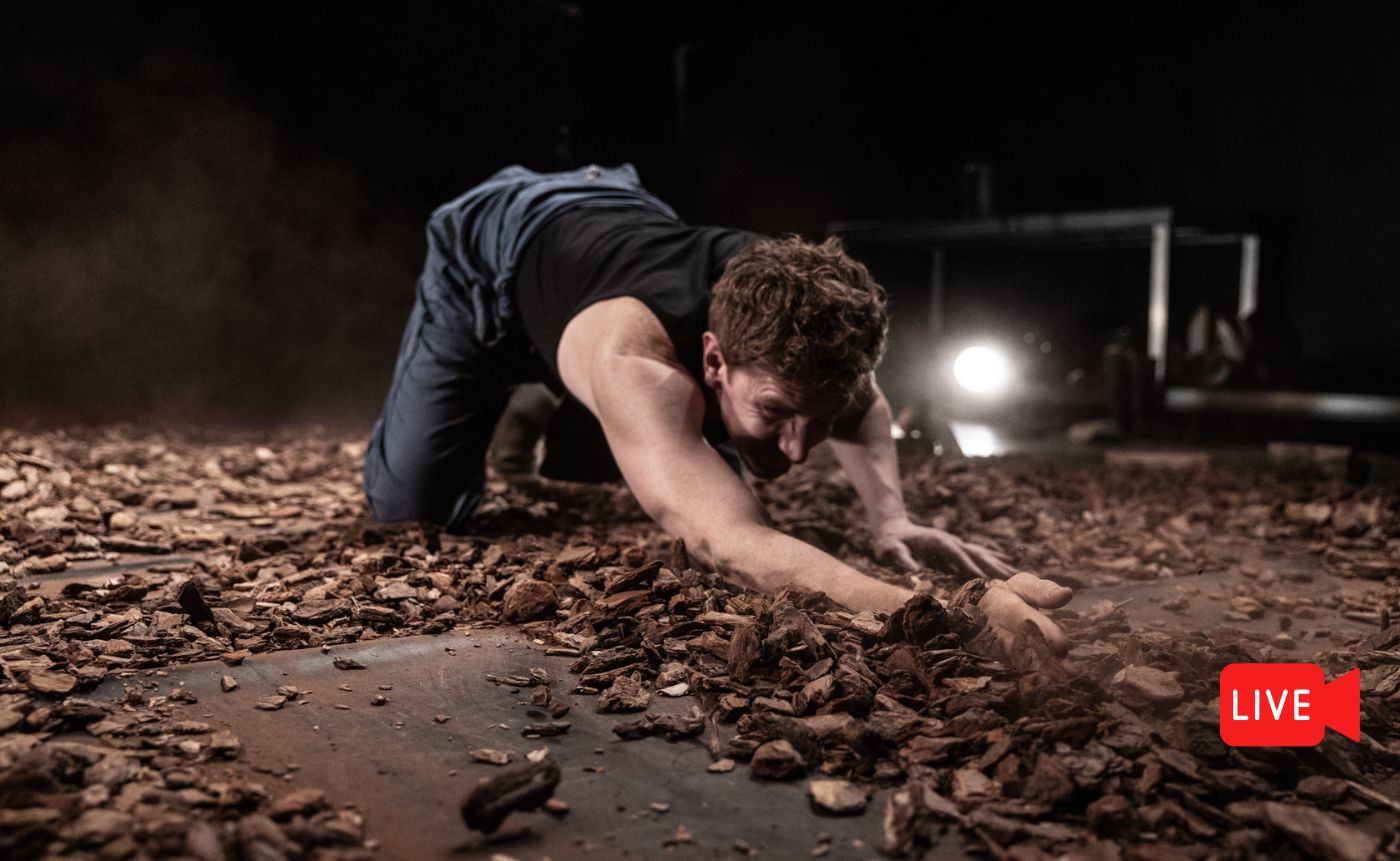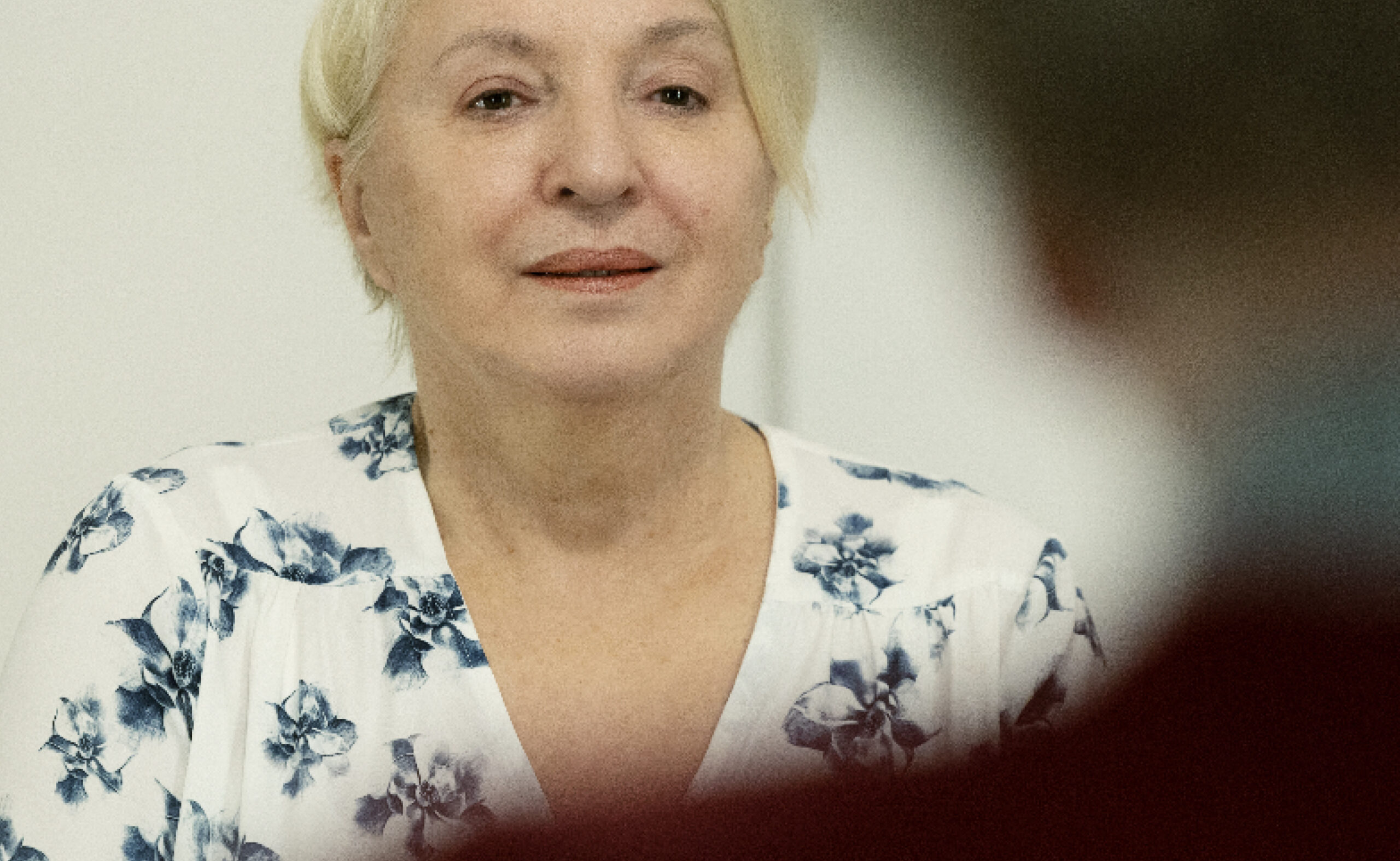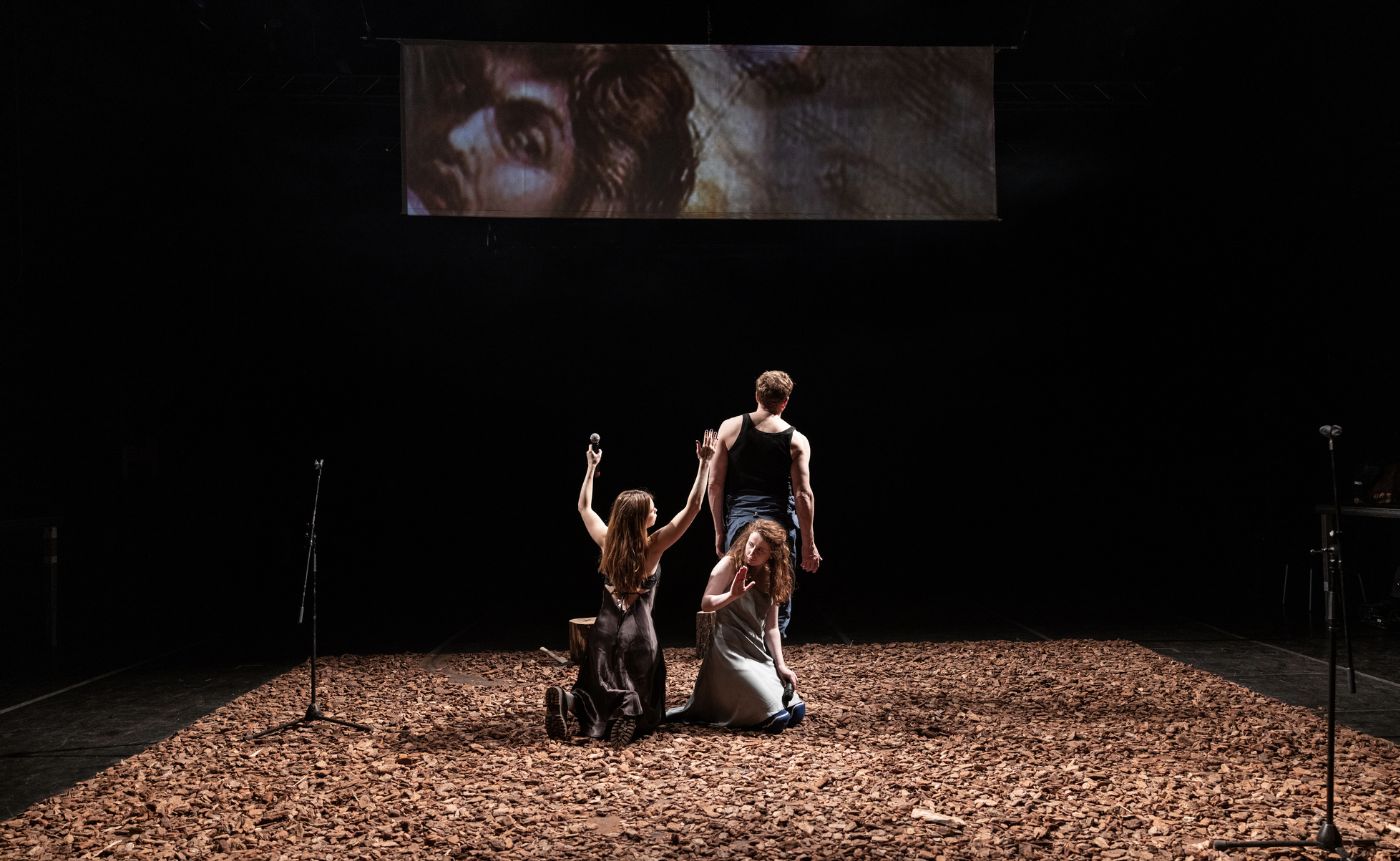
From the Other Side, Balkan Showcase – December 3-14
December 4-14, 2025
Ellen Stewart Theatre
66 East 4th Street
New York, NY 10003
Tickets:
Adults: $30
Students/Seniors: $20
First 10 @ $10 Tickets
Ticket prices are inclusive of all fees.
Running Time:
They Are All Gone, 100 min
Things That Burn Easily, 80 min
 December 14th event will be live streamed available for audiences nationally and internationally, get tix now!
December 14th event will be live streamed available for audiences nationally and internationally, get tix now!
December 11 – 14 – THEATRE PERFORMANCE
Things That Burn Easily
Written by: Vedrana Klepica
Directed by : Vedrana Klepica
Things That Burn Easily
Written by: Vedrana Klepica
Directed by : Vedrana Klepic
UP NEXT, FREE EVENTS:
December 13 at 12:30 pm – VIDEO SCREENING
Zoran Ðindic
Author’s Project by Oliver Frljic
——————-
December 14 at 1:00 pm – STAGED READING
All of a Sudden, A River
Written by Dimitrije Kokanov
Directed by Davin Brain
——————-
December 14 at 6:00 pm – Closing discussion
Theatre and Its Context
Reimagining Theatre From The Balkans, Edition 1.0
They are All Gone
&
Things That Burn Easily
Photos by Nebojša Babić & Jelena Janković

December 19-21, 2025
Ellen Stewart Theatre
66 East 4th Street
New York, NY 10003
Tickets:
Adults: $35 Adults
$50 – $75 Support the Artist Tickets*
Students/Seniors: $30
La MaMa Members:$10
10 @ $10 Tickets: First ten tickets to every performance are $10 each (limit 2 per person)
Ticket prices are inclusive of all fees.
ABOUT
We live in a time of relentless and continuous warfare. When the history of humanity is remembered through war, peace appears to be an unattainable goal. When hostilities cease, the resulting trauma and memories linger in the devastated societies, shackled by fear. Under neoliberal capitalism, postwar societies are no longer seen as worthy investments – peace no longer pays.
“The Balkans” is a political and cultural construct, a former warzone that, following the traumas of the late 20th century, entered the 21st century amid ongoing tensions. The region continues its attempt to shift into a phase of development, positioned, as always, at the crossroads of cultures – East and West, the South and the North. It consistently longs to articulate its own identity, an identity that is inherently unstable and shaped by a multitude of factors: ethnic, religious, gender, sexual, and beyond.
The other side of this is the Balkans art context – a space of new, vital and, as we believe, fully relevant theatrical life.
FROM THE OTHER SIDE unpacks the phenomenon of Otherness. It addresses the position of women amidst the alarming rise in femicide in the Balkans, the struggles of queer individuals facing institutionalized violence, the consequences of environmental disasters, and persistent national and religious divisions. The showcase presents a society struggling to confront its collective trauma and take responsibility for past crimes, often remaining trapped in narratives of war. It critically examines resistance to the integration and acceptance of minority groups who do not fit into the majority’s ideal of homogeneity. FROM THE OTHER SIDE provides a platform for artists who challenge their social contexts, advocating for freedom in societies that remain closed to Others.
At the heart of our program is the desire to make space for voices long forgotten or deliberately ignored — a reminder that we are all part of a shared global struggle. Even when we are not at the center of attention, Balkan artists speak truths that resonate far beyond their borders.
La MaMa Experimental Theatre and My Balkans, from New York, together as producers, stand behind FROM THE OTHER SIDE, Reimagining Theatre from The Balkans, Edition 1.0, a unique undertaking to happen in New York City from December 4-14, 2025, when La MaMa will become a home to the artists from the Balkans. This showcase will primarily consist of two theatre performances – created in their respective local context, all for the first time shown in the United States. It will also include staged readings of three contemporary plays from the Balkans, followed by conversations and discussions that will enable the presentations to become part of a living dialogue in the context of New York City. Video presentations of three exceptional theatre productions will offer additional insights into the Balkan theatre scene .
Reimagining the Theater From Balkans invites us to open ourselves to new themes, poetics and approaches to theatre performance, and to reconsider its political context through a different lens.
SELECTORS’ NOTE
While creating this program, our central aim was to establish a space for dialogue. In that spirit, every component of the program is designed to encourage reflection and discussion — not only about the Balkans and its theatrical landscape, but more importantly, about the role of public discourse, and the understanding of theater as a space for open debate and engagement with the pressing issues of our time.
Through the program’s four segments, we have created opportunities for local audiences and the professional community to engage with what we believe to be a relevant and representative sample of theater from the region.
Each section has been thoughtfully curated to address not only the aesthetic and political questions explored in contemporary Balkan theater, but also the practical challenges — the technical and economical (im)possibilities — of realizing such an event, regardless of its significance. We are pointing out the problems of art and politics in neoliberal capitalism.
Accordingly, the Live Performances section features two productions that offer distinct perspectives on themes of collective and individual memory, tradition and the past. The Stage Readings segment presents a selection of texts that showcase the formal and poetic qualities of contemporary drama recognized across the broader European context. The third segment, Performances on video or projections of archival recordings, features important 21st-century productions by some of the region’s most prominent directors, offering a rare glimpse into significant theatrical achievements. Finally, the Round Table Discussions will serve as a platform for dialogue on the intersections of art and politics as it is introduced in the chosen art works.
FROM THE OTHER SIDE – Reimagining the Theater of the Balkans 1.0 marks a starting point — an invitation to explore the possibilities of this kind of cultural exchange within our current political moment. It also serves as a reminder that many stories and struggles continue to unfold across the world, often in places from which we rarely hear, or choose not to look at. One such stories is the ongoing struggle in the Balkans — a region still marked by the rise of right-wing politics, social violence, and systemic discrimination. From the other side of ignorance is listening. From the other side of silence is the act of speaking one’s truth. From the other side of inaction is dialogue. Let’s reimagine our side — through theater.
Beka Vučo, Dimitrije Kokanov and Natasha Tripney
THEATRE performaces:
 They are all Gone
They are all Gone
Heartefact
Serbia, Belgrade
ABOUT
This play examines the position of all of us in the audience—how we understand and relate to those who survived the genocide in Srebrenica. It is the artistic way of questioning and trying to understand the fates and consequences of the wars that took place across the former Yugoslavia. You will meet Sadika, a fictional character, and her family—also fictional—whom she lost and never really had. Can people truly continue to live if we remember them? And what happens if we forget? Now, as this play is being created and performed, people in the Balkans are once again hearing similar voices—those who hate, who spread fear, and who deepen the consequences of a war that ended thirty years ago.
CREDITS
WRITTEN BY: Doruntina Basha
DIRECTED BY: Andrej Nosov
STARRING:
Mirjana Karanović
Svetozar Cvetković
Alban Ukaj
with voices of Maja Salkić, Davor Sabo, Kemal Rizvanović, Matea Mavrak, Hana Zrno, Sanin Milavić, Faruk Hajdarević, Alen Konjicija, Natalia Dmitrieva, Dino Hamidović
TRANSLATION: Alexandra Channer
SET DESIGN: Zorana Petrov
COSTUMES: Selena Orb
MUSIC: Draško Adžić
LIGHT DESIGN: Nemanja Calić
SOUND DESIGN: Nikola Erić, Luka Cvetko
TECHNICAL CREW: Nikola Erić, Luka Cvetko, Nađa Vukorep, Nemanja Calić
SOUND RECORDING: Mirza Tahirović/Studio “Chelia”
PRODUCTION: Aleksandra Lozanović, Selena Pleskonjić, Ksenija Milutinović
DRAMATURGICAL SUPPORT: Nejra Babić Halvadžija
PHOTOGRAPHY: Nebojša Babić
VISUAL DESIGN: Ismar Žalica
TRANSLATOR:Alexandra Channer Producer Heartefact (Serbia), Coproducers Sarajevo War Theatre SARTR (Bosnia and Herzegovina) and My Balkans in collaboration with Allianz Foundation, Ibsen Scope 2022 Winner, Creative Europe, Sigrid Rausing Trust.
BIOS
Heartefact is a multidisciplinary organization that has been actively shaping the independent cultural scene in Serbia and the region of Western Balkans for 15 years. Through engaged art, activism, knowledge exchange, and various granting mechanisms, Heartefact supports artists, activists, and organizations working on important social issues. They focus on contemporary and engaged art through the production of theatre performances, exhibitions, and other cultural events. Since 2022, Heartefact has its own stage in the center of Belgrade, Heartefact House, with a regular repertoire that explores important social topics. Over the past 15 years, Heartefact has produced more than 50 artistic works, published numerous contemporary plays, and awarded over 100 grants, contributing to a more open, just, and tolerant society.
 Things That Burn Easily
Things That Burn Easily
Ganz Culture For Change
Zagreb, Croatia
ABOUT
Things That Burn Easily narrates a story of about family living on a modest piece of land affected by a catastrophe. Some of them believe that they have been wronged by irreparable injustice and that a system that will compensate for some of the consequences of it should exist. Others are skeptical and have modeled for themselves a picture of the world in which every other individual is a potential threat, and the only reliable certainty comes from social and societal isolation, and autonomous construction of their own systems of survival and belief. When a big new natural disaster appears on the horizon, the tragedy of it will escalate into an unbearable misunderstanding of these two principles.
CREDITS
WRITTEN BY: Vedrana Klepica
DIRECTED BY: Vedrana Klepica
STARRING: Hrvojka Begović, Lea Jevtić, Vladimir Aleksić
SET DESIGN AND COSTUMES: Petra Pavičić
CHOREOGRAPHY: Magdalena Reiter
ORIGINAL MUSIC AND SOUND DESIGN: Hrvoje Nikšić
LIGHT DESIGN AND VIDEO: Luka Matić
PRODUCTION AND TOUR COORDINATOR: Silvija Stipanov
STAGE MANAGER AND ASISTANT DIRECTOR: Srđana Vrsalović
PHOTOGRAPHY: Jelena Janković
VISUAL DESIGN: Sven Sorić
TRANSLATION: Marija Andrijašević
BIOS
Ganz nova kultura promjene is an art organization that works at the intersection of performing arts, educational initiatives, interdisciplinary artistic practices, and environmental art. Founded in 2019 in Zagreb, it builds on the legacy of Culture of Change (2004–2018), a pioneering program of Student Centre Zagreb initiated by theatre director Nataša Rajković which has received over 70 national and international awards, as well as on Ganz New Festival – International Festival of Developmental Theatre (2011–2020), which nurtured new artistic languages, connected local and international contexts, and opened space for social transformation through art. As a collective of artists and curators, today Ganz nova nurtures hybrid practices at the intersection of theatre, dance, visual arts, music, and community art, addressing topics such as climate change, deforestation, gender and social inequality, and precarity in the arts. By creating spaces for artistic innovation and collaborative learning, Ganz nova kultura promjene nurtures a culture of change missing from the national and regional context.
“The Last Girls on Earth” by Maja Pelević
Translated by Maja Pelević, Directed by Alice Reagan, December 6 at 12:30 pm at Ellen Stewart Theatre
ABOUT
Today, more than ever, our system absorbs every facet of human existence and profits from them. The Last Girls on Earth explores situation that even biological and emotional aspects like motherhood are marketable goods. A woman’s worth is often linked to her status as a mother, making those without children feel devalued and pressured to fulfill that role. This environment fosters the transformation of a fundamental human desire into a commodity, with children becoming a resource to own. The story begins where the womb becomes a factory and the child a luxury product.
The Last Girls on Earth received award for the best contemporary play at biggest national theater festival in Serbia.
BIO
Maja Pelević is a playwright, dramaturg, performer, director and screenwriter. She is the author of more than twenty plays, dramatizations, and adaptations. She has worked as a dramaturg on over 20 theatre productions and has dramatized several novels. She has written songs for four musicals and scripts for three TV series. She is the recipient of all major national awards for playwriting. Her plays have been translated into English, French, German, Russian, Norwegian, Polish, Slovak, Czech, Hungarian, Bulgarian, Slovenian, Macedonian, and Ukrainian, and have been published in numerous contemporary domestic and international anthologies. She worked as a dramaturg at the National Theatre in Belgrade from 2007 to 2010. She taught the subject Cultural Diplomacy at the Faculty of Media and Communications in Belgrade, and Dramaturgy at the Faculty of Dramatic Arts in Montenegro.
“All Adventurous Women Do” by Tanja Šljivar
Translated by Aida Spahić
Directed by Tea Alagić December 12 at 1:00 pm at Ellen Stewart Theatre
ABOUT
All Adventurous Women Do explores the social phenomenon of seven thirteen-year-old girls who fell pregnant on a school trip. Here Šljivar’s gives voice to young female subjects whose speech in public space is prevented, and whose very experiences are often interpreted and processed with certain ideological points of view and from the perspective of the adult world, which does not see girls as equal social subjects.
All Adventurous Women Do had its world premiere at the Deutsches Theater in Berlin and has been publicly read and performed in various countries, including Serbia, Germany, USA, Croatia, Austria and Italy. It has been translated into seven languages thus far.
BIO
Tanja Šljivar studied dramaturgy at the Faculty of drama arts in Belgrade and applied theater studies at JLU in Giessen. Her plays have been publicly read and produced in professional theaters in Bosnia and Herzegovina, Croatia, Serbia, Albania, Spain, Poland, Austria, Finland, Slovakia, USA, and Germany. She also writes film screenplays. She won several awards for her playwriting and has been a guest at writing residencies in Austria, Kosovo, Croatia, Czechia, Hungary, and Spain. In 2019, she worked as an artistic director of the drama department at the National Theatre in Belgrade. She teaches playwriting at the University in Belgrade and has also taught at Universities in Banja Luka and Vienna.
“All of a Sudden, a River” by Dimitrije Kokanov
Translated by Matt Robinson
Directed by Devin Brain
December 14th at 12:30 pm
Ellen Stewart Theatre
ABOUT
Composed of three parts, All of a Sudden, a River, with its dystopian narrative, focuses on themes of colonialism, international warfare, social oppression, authoritarian regimes, the disenfranchisement of the Other, and issues of the pervasive violence within patriarchal and heteronormative societies. The play is an authentic response to Orwell’s 1984. Conceived as a space for silenced voices, this play allows its characters to speak in a way that the world can finally hear — revealing their deepest fears. In its conclusion, the author predicts a radical regression of civilization, reducing society to a distorted version of so-called “traditional” values.
All of a Sudden, a River had its premiere in Slovenia in 2022, and later was published as part of a collection of plays by the same author.
BIO
Dimitrije Kokanov is a writer, dramaturg and screenwriter. He is the resident dramaturg at Atelje 212 Theatre in Belgrade. His plays have been translated into several languages and performed both in Serbia and internationally. He is the recipient of all major national awards for playwriting. As a dramaturg, he has collaborated on over 70 projects across various performing arts practices (mostly theatre and contemporary dance), both in Serbia and abroad. He also works as a director of radio plays. His main interests are performance theory and history, as well as philosophical post-humanism, queer and feminist theories
Video Perfromaces:
The two live performances to be shown highlight a vibrant and challenging segment of Balkan culture. However, they only represent a fraction of the broader creative landscape. FROM THE OTHER SIDE video presentations, available during the two-week run, showcase significant artistic and thematic achievements that are not easily available to travel. This selection of three productions underline the notable directors and theatres from the region.
The World and What It Holds
Written by Aleksandar Hemon
Directd by Selma Spahić
Sarajevo War Theatre SARTR
and Realstage
Sarajevo, Bosnia and Herzegovina
December 5 at 1:00 pm Ellen Stewart Theatre
ABOUT
This is a refugee epic centered around a powerful love story between two Sarajevo conscripts on the frontlines during World War I. The play confronts us ,once again, with the question of how love can survive, in what forms it manifests, and whether it is a strong enough force to keep us alive even in the most extreme circumstances. We remember history through the lens of those who have the privilege of leaving a mark and recording their memories. But what about the history of all those who do not have that privilege?
BIO
Aleksandar Hemon is a Bosnian American author, essayist, critic , television writer and screenwriter. He is best known for his powerful novels Nowhere Man and Lazarus Project as well as short stories and novels that explore issues of exile, identity, and home through characters drawn from Hemon’s own experience as an immigrant.
Selma Spahić is a well-known theater director from Sarajevo, Bosnia and Herzegovina where she finished the Academy of Performing Arts. She works at theatres in Bosnia and Herzegovina, Slovenia, Croatia, Serbia and Montenegro and teaches directing at her alma mater. She directs works by Maxim Gorki, Jean Genet, Ferenc Molnar, Frank Wedekind, but also plays by authors such as Simona Semenič, Tanja Šljivar, Karim Zaimović, Dino Pešut, Tom Zajec. Her theatre projects are partly documentary and are developed together with the performers. From 2012 to 2017, Spahić was the artistic director of the International Theatre Festival MESS in Sarajevo.
The Sarajevo War Theatre (SARTR) was founded in1992 during the war years, bringing together actors and collaborators from three professional Sarajevo theatres. During the war, actors and other theatre professionals from Sarajevo’s theatre scene became affiliated with SARTR and performed more than 200 shows during the four-year siege. Founded during the siege, SARTR stands as a testament to the phenomenon of spiritual and cultural resistance to fascism and aggression. Today, SARTR brings together actors and theatre professionals of all generations in the space of the former iconic Sarajevo Center for Social Activities and works across the Balkan region and Europe.
Cement Belgrade
Written by Milan Ramšak Marković
Inspired by Heiner Muller,
Directed by Sebastijan Horvat
Belgrade Drama Theatre
Belgrade, Serbia,
December 7 at 1:00 pm Ellen Stewart Theatre
ABOUT
Inspired by the East German playwright Heiner Müller, Sebastijan Horvat’s production, which he developed with Milan Ramšak Marković, is set in present-day Belgrade. The relationship between trauma and memory, political dementia, as well as the conflicts inscribed in our bodies are some of the motifs that characterise this work. The play won the »Mira Trailović« Grand Prix at the 54th BITEF Festival and many other rewards
BIO
Milan Ramšak Marković is an award-winning dramaturge, playwright, and actor from Belgrade. In addition to his work in institutional drama theatre, he also writes for film and television and is an active member of the Serbian contemporary dance scene and the independent arts scene. His plays have been staged in Serbia, Croatia, Slovenia, Lithuania, and England. As a dramaturge, he has worked in theatre productions across Croatia, Denmark, Germany, Slovenia, Italy, and Serbia. He is the recipient of numerous awards for his work, including the Slavko Grum Award, the Sterija Award, the Mihiz Award, the Award at the Week of Slovenian Drama, among others.
Sebastijan Horvat is one of the most internationally recognized and most creative Slovenian theatre directors. Over the course of his rich career, Horvat has directed in the independent theatre scene, in all professional theatres in Slovenia, and in many theatres abroad. For his theatrical work he has received numerous prestigious awards, among them the Prešeren Fund Award, the Montblanc Young Directors Award at the Salzburg Festival (Salzburger Festspiele), the Borštnik Award for Best Direction, the Šeligo Award for Best Production at the Week of Slovenian Drama, the Grand Prix ’Mira Trailović’ for Best Performance, and the Politika Award for Direction at the BITEF Festival in Belgrade. He is one of the founders of the independent theatre institute E. P. I. Center and a full professor of acting and directing at the Academy of Theatre, Radio, Film and Television in Ljubljana.
Belgrade Drama Theatre was founded in 1947 under the name City Theatre. As the oldest city theatre in Belgrade, it became a model of modern theatre, enjoying great public affection and strong financial support from the state. Today, Belgrade Drama Theatre strives to provide writers and actors with the opportunity to develop a contemporary theatrical repertoire on its stages. An increased number of productions and frequent guest performances make stagings of new plays widely accessible to the public.
Zoran Đinđić
Written and Directed as an author’s project by Oliver Frljić
Theatre Atelje 212
Belgrade, Serbia
Ellen Stewart Theatre December 13 at 12:30 am at Ellen Stewart Theatre
ABOUT
The play deals with the issue of guilt and trauma in society following the assassination of Prime Minister Zoran Đinđić of Serbia in 2003. This significant and brutal historical moment served as a point of departure for the artists, led by author Oliver Frljić, to question collective consciousness and the responsibility of the entire community. It also raises the issue of artistic responsibility in communicating with the audience on topics that transform and define our individual participation in the life of that very same community. Among many awards, the play won the »Mira Trailović« Grand Prix at the 47th BITEF Festival.
BIO
Oliver Frljić, originally from Bosnia-Herzegovina, works as a director, author, actor and theorist in Croatia, where he studied philosophy, religious studies and directing. His productions have garnered him several awards and invitations to international festivals, including the Wiener Festwochen for his 2010 production Mrzim istinu! (I hate the truth!), and the Heidelberger Stückemarkt new play festival for Black Box Schule, developed at Schauspielhaus Düsseldorf. From 2014-2016 he served as the artistic director of the Croatian National Theatre in Rijeka. In early 2016 he announced that he was resigning out of protest against Croatian cultural policy.
Frljić works throughout the Balkans region and Europe and was closely affiliated with the Maxim Gorki Theatre in Berlin, first, as the member of their Board and later from 2022/24 as the Co-Artistic Director.
Theatre Atelje 212 was founded in 1956 In Belgrade, Yugoslavia [today Serbia]. In its early years, performances were held in a converted hall of the communist daily newspaper Borba (Fight) building. A new building was designed by well known director Bojan Stupica and still stands at its current location in downtown Belgrade. Thetare Atelje 212 has become known for its repertoire that explores and follows contemporary dramatic texts from around the world, as well as for being a theatre that experiments with modern acting expressions. The founder and longtime Artistic Producer Mira Trailović, in 1967 founded and for many years led the renowned BITEF (Belgrade International Theatre Festival), that broought to Belgrade avantgarde, experimental and exceptional productions from all over the world. Through the close friendship with Ellen Stewart, Trailović first brought La MaMa Experimental Theatre’s shows to the Balkans.
ROUND TABLE DISCUSSIONS:
Opening round table discussion:
“ART and/or/is POLITICS”
The panel discussion on the role of arts and culture in the socio-political milieu of the Balkans. The aim of the discussion is to question the position of labor in the arts, and art itself as a space of (un)freedom within oppressive social systems. What are the dangers of the instrumentalization of art for political purposes? What is the role of didacticism in theater and its potential for enlightenment in contemporary society?
December 3rd at 1:00 pm
Panelists:
Mirjana Karanović
Tanya Domi
Andrej Nosov
Natasha Tripney
Beka Vučo
Moderator Dimitrije Kokanov
Closing round table discussion:
“THEATRE AND ITS CONTEXT”
Some of the topics to be tackled are: does everything that is written and/or performed today in the theater have to have a political /social connotation? And/or how do the political/social views of the author correspond to the context of the production?
December 14th at 6:00 pm
From the Other Side: Reimagining Theatre From The Balkans, Edition 1.0 is made possible with support from the Trust for Mutual Understanding.










